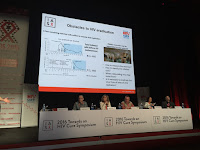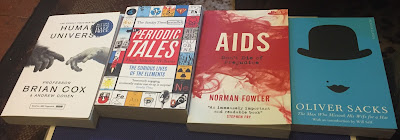We rise at 7.30 and have breakfast before heading off to the ICC. I'm not looking too bad considering I went to bed at midnight. We go straight upstairs to find session room 11. My stomach is still abit upset as it was yesterday. I am late to the start and end up with Rolande on the front row. I find myself sitting next to Francois Barre-Sinoussi! This mornings session is more science intensive than yesterday. This turns out to be true all day much to my delight. This 9am session is entitled HIV Latency and reversal strategies.
Our first speaker was Miles Davenport from Australia talking about SIV in macaques. Using SIV to study latency generates alot of diversity over a small area.
Next was Alexander Pasternak from Amsterdam University. He talks about what determines the rate of viral suppression after ART initiation and concludes that unspliced RNA is not predictive.
The third and last speaker in this session was Andrew Badley from the mayo clinic talking about why reactivating cells dont die. Strangely I don't have a photo of him. Reactivating cells are programmed to resist cell death. It has been found that a BCl2 antagonist promotes the death of reactivating cells.
At 10am a speaker named Eric Cohen from Montreal University spoke about broadly neutralising antiHIV antibodies.
Then Georgio Bozz from the National Cancer Institute talked about how HIV genetic diversity increases over time. HIV in tissue and blood is analysed and found to be detectable 12 hours post mortem.
After a coffee break, the next session includes several speakers and a poster session at 11am.
First up is Prof. Olivier Lambotte from Paris University. He speaks of how onocology can help HIV eradication. The goal for cancer and HIV is the same, to kill or control rare events.cellular therapies are effective in both HIV and leukemia.
Then we had Dr Anna-Marie Wensing from Utrecht University. She spoke about Epistem, a consortium of 6 projects. Patients recieve a transplant and multiple biopsies are taken. In time it was found that only traces of HIV DNA was detected. Great to hear a positive outcome.
Next was Dr Chris Peterson of the Fred Hutchinson Cancer Institute.
He spoke of the road to a functional cure and mentioned the only example of this to date, the Berlin Patient, Timothy Brown. Transplantation depletes T Cells. The proportion of long term grafted stem cells were increased and it was found that early grafting i.e. the most edited gave most effective results. There is a need to evaluate T cell gene therapy as an alternative/complement to stem cell gene therapy. Though I have never got around to looking this up, I have often wondered if there were any scientists anywhere looking at the approach which worked for Tim Brown. I am so pleased, over the moon, to discover that there are. Left this session feeling happy though more talks to come yet.
Another researcher from Utrecht University, Monique Nijhuis. She spoke of current ART therapies and concluded that gene editing is the way to go in future.
Li Haung from Duke University, North Carolina.Her aim is to identify a compound which can work on the 'kill' phase ( in the shock and kill technique). So far a possibility is Gindimacrin which is potent and exhibits good selectivity.
The final speaker is Jintanat Aranworanich who works with drugs which have different modes of action. There is rebound though with treatment interruption. The drugs are well tolerated by most patients though. She concludes that alternative strategies to reduce or eliminate HIV reserviors are needed.
Rolande and I spend alot of time at this poster with its owner having a great discussion.
It is now 12.30pm which is lunchtime. On our way out of the room we are handed a voucher for lunch downstairs. Sounds exciting though I am still not feeling hungry. The dining room is huge with lots of good food to help ourselves too. I want to eat but don't have much. I have alot of mixed salad, some chunky mixed veg, a bit of stew which turns out to be a potato and bean curry which is very nice. Also a few mixed veg noodles. I had a tiny dessert too. Over lunch Rolande asks me out of the blue if I would like to be on the board of advisors of Chemists Without Borders. I never expected this question but I would be honoured and flattered to be. I said that yes I would if I were asked. I will have to see where that leads. It made me happy though and made me think of the fact that I have been on the scientific border of advisors for The Rutger Hauer Starfish Association now for a year already. After eating Rolande and I head to the Global Village and end up watching 10 minutes of a talk already in progress: Coast of Dreams. This earned us a pink dot on our lanyards.
The 2pm session sees us back in room 11 for a table discussion moderated by Judith Auerbach.
The theme is bridging the gap between biomedical and social sciences towards an HIV cure.
Access to information in HIV in Africa is still scarce and this needs improvement. Evidence based information is needed for public understanding. Research carried out in the US needs to be then translated so it can also be done in Africa.
During the Q&A it is pointed out that a 'cure' for AIDS isn't the same as talking about an actual cure say for example, for TB where a cure does mean a cure.
A coffee break at 3.10pm includes scones which I can't resist even lunch hasn't digested yet. I'm glad I had one, it was nice and light. The next session begins at 3.25pm but I am late again as my SA tummy bug has me dasing to the bathroom again. The theme of this session is the immunology of HIV persistence.
HIV DNA in lymph nodes. This is studied by looking at SIV replication in macaques.
Dr Barbara Feller from the NIH Cancer Institute. She looks at cytokine (hetl-15) production on a large scale in macaques. This is a unique immune system agonist for cancer and HIV immunotherapy.
Dr Jean-Pierre Routy of McGill University, Canada. Looks at both PD-1 expression in mice and PD-1 block with ART in macaques. Found to give an increase in proliferation and function of CD cells. In conjunction with other therapies, this may give additional benefits.
At 4.30pm:Dr Julia Prado from Irsi Caixa discusses shock and kill therapies.
She uses a 'resting like' HIV-1 reactivation model (RELI)
The last speaker from Emory University os Ann Chakroudi.
An SIV RNAscope in situ hybridization in macaques. ART was well tolerated and leaves very little drug in the brain.
Next a young chinese researcher was presented with an award for her research. Then the closing speaker Prof. John Wherry of Pennsylvania University spoke of how a cancer cure could be used to treat HIV. He spoke of the development and reversal of T cell exhaustion.
This is common in mice as well as in humans.
So this is the end of a very full pre-conference for me and I am really pleased I had come to this. It does help you settle in and give a flavour of things to come for newbies like me. I have learnt alot so this makes me happy. The night is not over yet though and we go to the official opening of the Global Village which begins at 6pm. They are running late as we wait patiently wait outside and also once inside. Ithought we wouldn't get a seat but we were lucky enough to get on the second row again. The major of Durban is among the speakers and one of the Master of Ceremonies was an HIV+ 5 year old girl called Cammie who was a muppet!

We enjoyed a tribal dance, a rap dance and a beautiful song in tribute to Nelson Mandela.

What I really liked and was moved by was a powerful poem read by a man but from the perpective of a woman who is a mother. It tells of the myth and cost of having sex with a child/virgin which prevents you from getting AIDS. Tells of the great losses and pain felt by a mother in this horrible situation.
There was also a musical group called the Sexphonics and this required audience participation, we had to sing along. We were in the section called semen and this is the word we had to sing. Definitely different.
So the Global Village is now open and this was a fun evening though I feel tired. We decide to walk around it for a glimpse of all it has to offer. Something nice which caught my eye was a 'Solidaritree'. It was very colourful and I noticed 2 ladies hanging red ribbons on it so went over to investigate. I see now that the ribbons have writing on them so I took one and wrote Starfish web address on it and hung it up. Not many on it yet, early days.....
A taxi back to our hotel
I buy £20 (R400) worth of phone vouchers from reception. Our thoughtful host also managed to get us a new door key cut so that Rolande and I have one each. I charge my phone and look at the conference programme planning tomorrow, the first day. Bed at 11pm.

 Once we leave the local area and walk into the town centre, taxi drivers keep approaching us. Rolande tells me it is unusual for white people to be on foot. It is busy and we see lots of shops with open fronts and a market. I was surprised to see a big Woolworths store. This isn't the scenic area near the ocean. I end up sweating and we decide to get a taxi to the ICC which is just over 2 miles away. These taxis are people carriers and it costs R5 each which is just 25p.
Once we leave the local area and walk into the town centre, taxi drivers keep approaching us. Rolande tells me it is unusual for white people to be on foot. It is busy and we see lots of shops with open fronts and a market. I was surprised to see a big Woolworths store. This isn't the scenic area near the ocean. I end up sweating and we decide to get a taxi to the ICC which is just over 2 miles away. These taxis are people carriers and it costs R5 each which is just 25p. 

















































